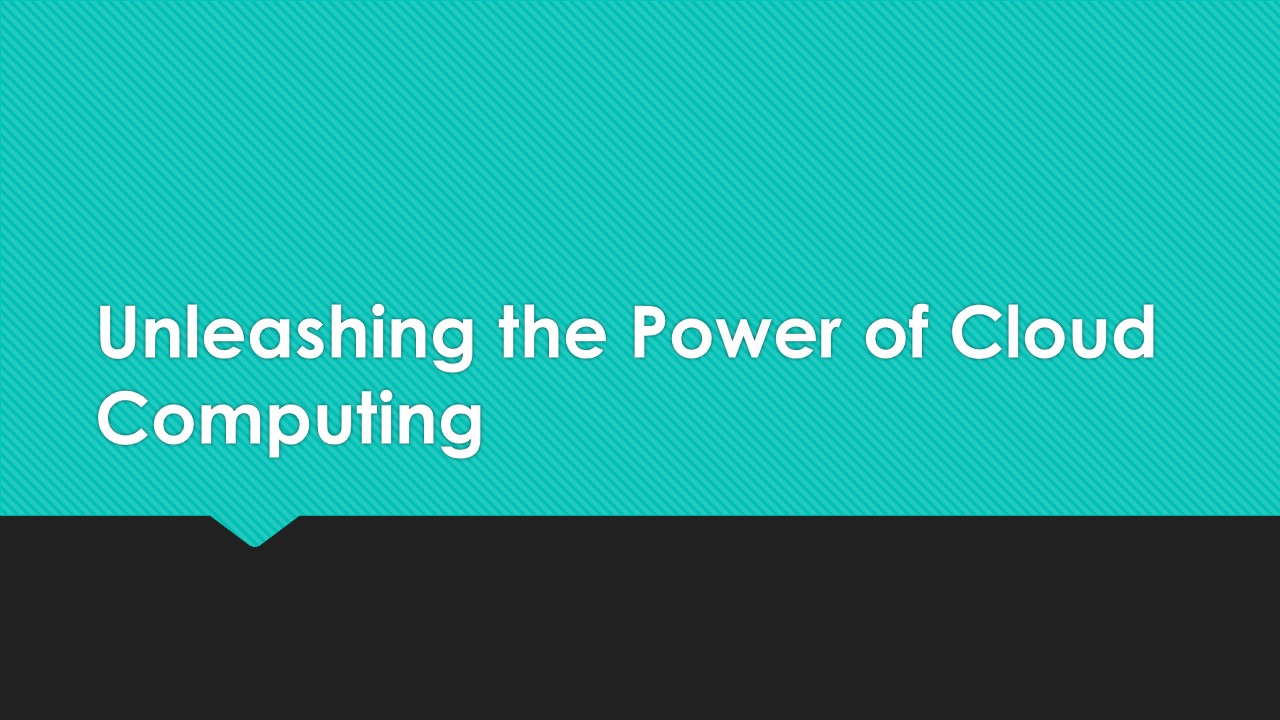cloud computing - PowerPoint PPT Presentation
Title:
cloud computing
Description:
Cloud computing refers to the practice of using a network of remote servers, known as the cloud, to store, manage, and process data instead of relying on a local server or personal computer. In cloud computing, the resources and services are accessed and delivered over the Internet. – PowerPoint PPT presentation
Number of Views:3
Title: cloud computing
1
Unleashing the Power of Cloud Computing
2
What is Cloud Computing?
- Cloud computing is a technology that allows users
to access data, applications, and services over
the internet without having to store them on
their own devices. This means that instead of
using local hardware and software, businesses and
individuals can use remote servers and networks
to store, process, and manage their data and
applications. - The benefits of cloud computing include increased
flexibility, scalability, and cost-effectiveness.
With cloud computing, users can easily scale up
or down their resources based on their needs, pay
only for what they use, and avoid the costs
associated with maintaining their own hardware
and software. Additionally, cloud computing
enables users to access their data and
applications from anywhere, at any time, as long
as they have an internet connection.
3
Benefits of Cloud Computing
- Cloud computing offers a range of benefits to
both businesses and individuals. One of the major
advantages is cost savings, as cloud computing
eliminates the need for expensive hardware and
infrastructure. This allows businesses to scale
up or down their IT resources based on their
needs, without incurring significant costs. - Another benefit of cloud computing is increased
flexibility and accessibility. With cloud
computing, users can access their data and
applications from anywhere with an internet
connection, making it easier to work remotely or
collaborate with others. Additionally, cloud
computing offers improved security features, such
as automated backups and disaster recovery, which
can help protect sensitive data.
4
Types of Cloud Computing
- Cloud computing can be categorized into three
main types public, private, and hybrid. Public
clouds are owned and operated by third-party
providers, where resources such as servers and
storage are shared among multiple users. This
type of cloud is ideal for businesses that
require scalability and flexibility without the
need for significant capital investment. Private
clouds, on the other hand, are dedicated to a
single organization and can be located
on-premises or off-premises. This type of cloud
is ideal for businesses that require high levels
of security and control over their data. Hybrid
clouds combine both public and private clouds,
allowing businesses to leverage the benefits of
both while maintaining control over sensitive
data. - Each type of cloud computing has its own unique
use cases. Public clouds are commonly used for
web applications, email services, and file
storage. Private clouds are commonly used for
mission-critical applications, such as those used
in healthcare and finance. Hybrid clouds are
commonly used for businesses that require both
scalability and security, such as e-commerce
websites and financial institutions.
5
Cloud Computing Security
- One of the biggest concerns with cloud computing
is the security of data stored on remote servers.
With sensitive information being transmitted over
the internet, there is always a risk of
interception by malicious entities. Additionally,
there is the risk of unauthorized access to data
by insiders or hackers who gain access to user
credentials. - To address these concerns, cloud providers have
implemented various security measures such as
encryption, access controls, and regular security
audits. It is also important for users to take
their own precautions by using strong passwords
and regularly monitoring their accounts for any
suspicious activity.
6
Cloud Computing Providers
- There are several major cloud computing providers
in the market today, each with its own unique set
of services and features. Amazon Web Services
(AWS) is one of the most popular cloud computing
providers, offering a wide range of services such
as compute, storage, and databases. Microsoft
Azure is another major player in the cloud
computing space, providing services such as
virtual machines, storage, and web applications.
Google Cloud Platform (GCP) is also a popular
choice, offering services such as data analytics,
machine learning, and storage solutions. - Other notable cloud computing providers include
IBM Cloud, Oracle Cloud Infrastructure, and
Alibaba Cloud. Each provider has its own
strengths and weaknesses, and businesses must
carefully evaluate their needs before choosing a
provider. Factors to consider include cost,
security, scalability, and ease of use.
7
Future of Cloud Computing
- As technology continues to advance, the future of
cloud computing looks promising. One potential
development is the use of edge computing, which
brings computation and data storage closer to the
devices that need it. This could greatly reduce
latency and improve performance for applications
that require real-time processing. - Another trend is the increasing use of artificial
intelligence and machine learning in cloud
computing. These technologies can help automate
tasks and improve decision-making processes,
leading to more efficient and effective
operations for businesses and individuals alike. - Reference
- Unveiling the Best eLearning Platform for
Exceptional Learning Experiences - The state of employees in the retail industry































